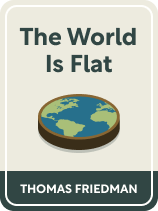

This article is an excerpt from the Shortform book guide to "The World Is Flat" by Thomas L. Friedman. Shortform has the world's best summaries and analyses of books you should be reading.
Like this article? Sign up for a free trial here.
What skills do you bring to the table? How can you compete in this economy—and in the economy of the future?
The world is changing fast. Thomas L. Friedman, in his book The World Is Flat, explains that the increasingly globalized nature of the world requires workers to have three skills to keep up: cooperation, integration, and versatility.
Continue reading for a discussion of these future work skills and an exercise that will help you consider your career in the globalized world.
The 3 Future Work Skills You Need
If the forces of globalization are changing the world as quickly and drastically as Friedman suggests, what can you do as an individual to thrive in such a world? Friedman argues that you must come to terms with the way the world is changing and focus on how you can add unique value to society.
(Shortform note: Figuring out how to thrive in a changing world can be a daunting task, but, luckily for humans, our brains have evolved to adapt well to changing conditions. In the relatively short time that hominids have existed, the climate and landscape of Earth have shifted dramatically. Because of this, our ability to think creatively and adapt to new environments proved to be a useful trait. Although the environment is changing much more quickly and in a much different fashion, our adaptability should help us thrive in the modern world.)
To add value to society, first understand that you’re now competing for jobs with billions of people across the globe and that many jobs of the past will no longer be available. Then, prepare for this shift by identifying which jobs will be available and figuring out the skills and knowledge you need to attain them. The valuable future work skills in a flat (globalized) world fall into these broad categories: cooperation, integration, and versatility.
(Shortform note: In Ultralearning, Scott Young elaborates on Friedman’s belief that you must accrue the skills needed for the jobs of the future by introducing the concept of “skill polarization.” This is the idea that in the future, medium-skill jobs will be outsourced, leaving only low- and high-skill jobs available. To avoid having to take a low-skill job, you must therefore constantly learn advanced skills and knowledge that prepare you for a high-skill role.)
Skill #1: Cooperation
With companies and workforces going global, Friedman argues that being able to cooperate with others or foster cooperation between others will be valuable. This could mean building relationships with clients from different parts of the world or helping new employees understand the cultural differences of their coworkers. In a world in which international collaboration is becoming the norm, working well with others will make you irreplaceable.
(Shortform note: Friedman advocates building your cooperative skills, but he doesn’t say how to do so. One way to encourage cooperative behavior in yourself and at work is by stressing the importance of relationships in the workplace. When you make work about social bonding (not just completing tasks), employees care about each other and their well-being, which fosters cooperation. It also improves performance, which is an advantage for the company.)
Skill #2: Integration
As we mentioned above, Friedman believes that many innovative ideas will come from the integration of two or more different ideas or skill sets. This means you should develop a wide set of skills and knowledge. Many graphic designers, for example, separate themselves from the pack by being exceptional at art and with computers.
(Shortform note: In Smarter, Faster, Better, Charles Duhigg elaborates on the idea that combining old ideas can be an especially efficient way to innovate. To devise an innovative product or idea, you don’t always have to come up with something entirely new. By combining old ideas in new ways, you can be creative without having to start from scratch. This can help you be more productive while also saving time and energy.)
Skill #3: Versatility
Friedman suggests another way to separate yourself from the pack: versatility. If you can quickly adapt, take on new roles, and provide value in multiple ways, you’ll be irreplaceable. He argues that being a specialist can be dangerous in a flat world because the world can change in an instant, leaving you and your specialized field behind. Experts in one programming language, for example, may find themselves out of a job when that language becomes obsolete. But, if you’re versatile and know multiple languages, you’re less likely to run into this problem.
(Shortform note: Because modern organizations must be able to adapt and respond quickly to changing market conditions, workforce versatility has become a key focus when hiring new employees. A versatile workforce benefits both employers and employees: A versatile workforce lets employers capitalize on all the skills their workers have, which boosts productivity and helps keep workers motivated. For their part, versatile employees are likely to be more satisfied, as they have more variety and freedom in their day-to-day work.)
Exercise: Consider Your Career in the Flat World
Globalization has affected nearly every aspect of modern life, from macroeconomics to the way we spend our time. For individuals, however, the most important aspect of globalization may be its effect on the job market. In this exercise, you’ll reflect on how you can remain gainfully employed in a flat world by building your versatility, cooperative skills, and ability to integrate ideas.
- If you’re in school now, how do you feel about the future job market? If you’re currently working, how might the industry you work in change in the coming years? Now, jot down some skills and knowledge you might acquire to be versatile and able to take on new roles and tasks in the changing labor market. (These might be skills like coding or learning a new language.)
- The ability to cooperate and communicate is vital in today’s society. Think about a time recently in which a lack of cooperation made your job or your life harder. What could you do in the future to work more effectively with others? (These might be things like improving your listening skills or developing a stronger relationship with coworkers.)
- Thriving in a flat world may require combining multiple skill sets in new and interesting ways. Think about two or more skills or abilities you have. How might you combine these skills to add a new form of value to a company? (For instance, if you have a strong social media presence and can also code, you might offer to create a video series about coding to help others in the company learn.)

———End of Preview———
Like what you just read? Read the rest of the world's best book summary and analysis of Thomas L. Friedman's "The World Is Flat" at Shortform.
Here's what you'll find in our full The World Is Flat summary:
- How the world is becoming one globalized society
- The potential costs and benefits of a flatter world
- How you can best contribute to a globalized society






